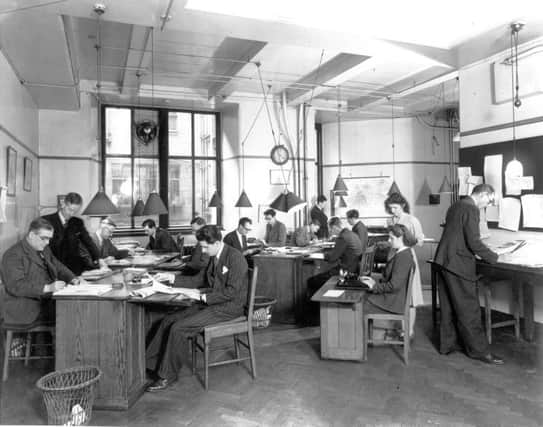Paris Gourtsoyannis: 200 years on, and still seeking truth


Two hundred years ago tomorrow, the very first edition of The Scotsman was printed. A BBC documentary last week examined the impact the paper has had on Scottish political and social life over the course of two centuries.
Delving into the archives, The Paper Thistle was at its best when recalling the triumphs of the newspaper in its heyday and the influence it wielded as a radical voice for Scottish interests, especially when the time came for those interests to be expressed in Scotland’s own political institutions.
Advertisement
Hide AdAdvertisement
Hide AdThe Scotsman helped make the case for a Scottish Parliament, and with its help that case eventually became unanswerable. Wherever national institutions of similar longevity and significance still survive, they are celebrated, if not defended.
But the programme-makers pulled no punches. Like all media organisations with a centuries-long legacy in print, The Scotsman faces big challenges posed by a technological revolution that has overturned a business model as old as the classified ads that once appeared on the front page.
The Scotsman has also had to adjust to other pressures, too. In the eyes of some independence supporters, including some Nationalist politicians, the decision to back the Union in an editorial ahead of the 2014 independence referendum – a view eventually confirmed by the will of the people – has made the paper a fair target. Indeed, some may well rejoice at the struggle it currently shares with other newspapers.
The BBC programme concluded with the words of veteran Scottish political reporter Robbie Dinwoodie, who reflected that the health of any major UK newspaper “would be a matter of great interest to the UK political establishment”.
The interest taken by some leading SNP figures in the fate of its major institutions hasn’t always been of the supportive kind. Thanks to the modern miracle/curse of social media, individual journalists can now expect to have the basic conduct of their craft directly questioned by their own elected representatives.
This newspaper is by no means the leading example of a media organisation questioned and criticised by Nationalist politicians, with the inevitable result that levels of public trust are undermined. That distinction must belong to the BBC, respected internationally but subject to a campaign of protest and insult in Scotland. Nor is turning on the media a wholly recent development, restricted to one party.
Journalists are a thick-skinned lot. We’re not looking for sympathy, and we’re certainly not looking to escape criticism. But increasingly, the endorsement of the idea that the media is a source of disinformation and misdirection is being allowed to undermine its central functions in a democratic society.
Politicians should be held accountable by journalists – not the other way round. Journalists, in turn, should be held accountable by the public – and we are today, more than at any point in the 200 years since The Scotsman came into being.
Advertisement
Hide AdAdvertisement
Hide AdReverse that equation and you get the terrifying farce played out in the White House press briefing room this weekend. In the words of Sean Spicer, the man put in charge of briefing the media by President Donald Trump: “We’re going to hold the press accountable as well.”
The argument between the Trump administration and the media over how many people attended the presidential inauguration may have a comic quality, but it has serious consequences. In the few days since he was sworn in, President Trump threatens to wear out the work of George Orwell as a source of political allegory, but this was literally a case of the government telling its people that two plus two equals five.
Not only does it distract from effective government and proper scrutiny of government, and raise basic questions about the honesty of those in power, but it also serves the purpose of further polarising a divided public, forcing the president’s supporters – already alienated from and distrustful of much of the media – to choose between Trump and the truth. Not just now, but any time the truth is inconvenient for the administration.
The incredible power of the internet and reach of social media inspired a belief that journalists were obselete, because everyone had access to the tools to produce information. Perhaps the US election is a blessing in disguise, because it has exposed how naive that view is.
The newly installed president, whose press secretary has yet to take any questions from the press, believes he can avoid the media and go straight to the public on a daily basis through Twitter with propaganda and personal vendettas.
His response to any attempt at scrutiny – attacking the media as “among the most dishonest human beings on Earth” – makes it clear that professional journalists are even more important in an age when everyone can carry a powerful computer around in the pocket, accessing any piece of information at any time whether they are equipped to digest it or not.
All institutions need criticism, especially old and powerful ones. Newspapers and the media in general are no exception, and they clearly must change to survive. All media organisations have to seek out a broader range of opinion to ensure they are representing society as it is, not as their audience imagines it to be.
But criticism should be constructive, and as regards the media, it has to recognise the good they have done and still do. There are few organisations designed and equipped to hold the powerful to account. Tear them down and laugh at the rubble, and you take your chances with whatever fills the void.
The Paper Thistle is available on the BBC iPlayer for another three weeks. Do watch it if you’d like to learn more about the role one newspaper has played in shaping Scottish society.